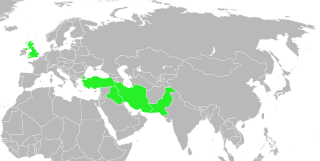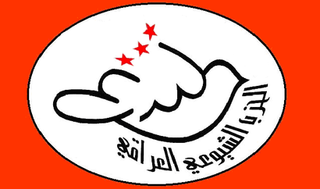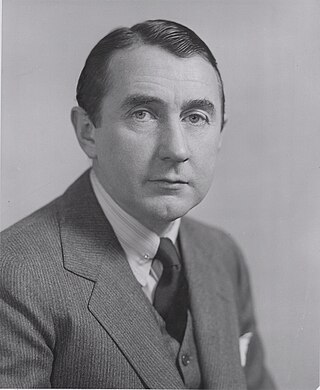Related Research Articles

The Suez Crisis also known as the Second Arab–Israeli War, the Tripartite Aggression in the Arab world and as the Sinai War in Israel, was a British–French–Israeli invasion of Egypt in 1956. Israel invaded on 29 October, having done so with the primary objective of re-opening the Straits of Tiran and the Gulf of Aqaba as the recent tightening of the eight-year-long Egyptian blockade further prevented Israeli passage. After issuing a joint ultimatum for a ceasefire, the United Kingdom and France joined the Israelis on 5 November, seeking to depose Egyptian president Gamal Abdel Nasser and regain control of the Suez Canal, which Nasser had earlier nationalised by transferring administrative control from the foreign-owned Suez Canal Company to Egypt's new government-owned Suez Canal Authority. Shortly after the invasion began, the three countries came under heavy political pressure from both the United States and the Soviet Union, as well as from the United Nations, eventually prompting their withdrawal from Egypt. Israel's four-month-long occupation of the Egyptian-occupied Gaza Strip and Egypt's Sinai Peninsula enabled it to attain freedom of navigation through the Straits of Tiran, but the Suez Canal was closed from October 1956 to March 1957.

John Foster Dulles was an American politician, lawyer, and diplomat who served as United States secretary of state under president Dwight D. Eisenhower from 1953 until his resignation in 1959. A member of the Republican Party, he was briefly a U.S. senator from New York in 1949. Dulles was a significant figure in the early Cold War era, who advocated an aggressive stance against communism throughout the world.

Allen Welsh Dulles was an American lawyer who was the first civilian Director of Central Intelligence (DCI), and its longest serving director. As head of the Central Intelligence Agency (CIA) during the early Cold War, he oversaw the 1953 Iranian coup d'état, the 1954 Guatemalan coup d'état, the Lockheed U-2 aircraft program, the Project MKUltra mind control program, and the Bay of Pigs Invasion in 1961. As a result of the failed invasion of Cuba, Dulles was fired by President John F. Kennedy.

The Central Treaty Organization (CENTO), formerly known as the Middle East Treaty Organization (METO) and also known as the Baghdad Pact, was a military alliance of the Cold War. It was formed on 24 February 1955 by Iran, Iraq, Pakistan, Turkey, and the United Kingdom. The alliance was dissolved on 16 March 1979.

Abdul-Karim Qasim Muhammad Bakr al-Fadhli al-Zubaidi was an Iraqi military officer and nationalist leader who came to power in 1958 when the Iraqi monarchy was overthrown during the 14 July Revolution. He ruled the country as the prime minister until his downfall and execution during the 1963 Ramadan Revolution.

The Iraqi Communist Party is a communist party and the oldest active party in Iraq. Since its foundation in 1934, it has dominated the left in Iraqi politics. It played a prominent role in shaping the political history of Iraq between its foundation and the 1970s. The Party was involved in many of the most important national uprisings and demonstrations of the 1940s and 1950s. It suffered heavily under the Ba'ath Party and Saddam Hussein but remained an important element of the Iraqi opposition and was a vocal opponent of the United Nations sanctions imposed on Iraq after the Gulf War of 1991. It opposed the United States invasion of Iraq in 2003 but since then has participated in the new political institutions. It received little support in the Iraqi general elections of 2005. The party gained some seats in each province in which the 2013 Iraqi governorate elections were held.

William Harding Jackson was a U.S. civilian administrator, New York lawyer, and investment banker who served as Deputy Director of the Central Intelligence Agency. Jackson also served briefly under President Dwight D. Eisenhower as Acting United States National Security Advisor from 1956 to 1957.
Hanna Batatu was a Palestinian Marxist historian specialising in the history of Iraq and the modern Arab east. His work on Iraq is widely considered the preeminent study of modern Iraqi history.

Naji Talib Arabic: ناجي طالب was the prime minister of Iraq from 1966 to 1967, replacing Abd ar-Rahman al-Bazzaz.

The New Look was the name given to the national security policy of the United States during the administration of President Dwight D. Eisenhower. It reflected Eisenhower's concern for balancing the Cold War military commitments of the United States with the nation's financial resources. The policy emphasized reliance on strategic nuclear weapons as well as a reorganisation of conventional forces in an effort to deter potential threats, both conventional and nuclear, from the Eastern Bloc of nations headed by the Soviet Union.

Archibald Bulloch Roosevelt Jr., the first grandson of U.S. President Theodore Roosevelt, was a soldier, scholar, polyglot, authority on the Middle East, and career CIA officer. He served as chief of the Central Intelligence Agency's stations in Istanbul, Madrid and London. Roosevelt had a speaking or reading knowledge of at least twenty languages.

Anarchism was an influential contributor to the social politics of the First Brazilian Republic. During the epoch of mass migrations of European labourers at the end of the nineteenth and the beginning of the twentieth century, anarchist ideas started to spread, particularly amongst the country’s labour movement. Along with the labour migrants, many Italian, Spanish, Portuguese and German political exiles arrived, many holding anarchist or anarcho-syndicalist ideas. Some did not come as exiles but rather as a type of political entrepreneur, including Giovanni Rossi's anarchist commune, the Cecília Colony, which lasted few years but at one point consisted of 200 individuals.

The 1966 Syrian coup d'état refers to events between 21 and 23 February during which the government of the Syrian Arab Republic was overthrown and replaced. The ruling National Command of the Arab Socialist Ba'ath Party were removed from power by a union of the party's Military Committee and the Regional Command, under the leadership of Salah Jadid.

The 14 July Revolution, also known as the 1958 Iraqi military coup, was a coup d'état that took place on 14 July 1958 in Iraq which resulted in the toppling of King Faisal II and the overthrow of the Hashemite-led Kingdom of Iraq. The Iraqi Republic established in its wake ended the Hashemite Arab Federation between Iraq and Jordan that had been established just six months earlier.
The Al-Wathbah uprising or simply Al-Wathbah, which means The Leap in Arabic, was the term that came to be used for the urban unrest in Baghdad in January 1948. The protests were sparked by the monarchy's plans to renew the 1930 Anglo-Iraqi Treaty that effectively made Iraq a British protectorate. Nuri al-Said, the Prime Minister of Iraq, was planning on renewing, albeit in a revised form, this 1930 treaty that tied Iraq to British interests, allowed for the unrestricted movement of British troops on Iraqi soil, and provided significant protection to the British-installed Iraqi monarchy.

The Ramadan Revolution, also referred to as the 8 February Revolution and the February 1963 coup d'état in Iraq, was a military coup by the Iraqi branch of the Ba'ath Party which overthrew the Prime Minister of Iraq, Abdul-Karim Qasim in 1963. It took place between 8 and 10 February 1963. Qasim's former deputy, Abdul Salam Arif, who was not a Ba'athist, was given the largely ceremonial title of President, while prominent Ba'athist general Ahmed Hassan al-Bakr was named Prime Minister. The most powerful leader of the new government was the secretary general of the Iraqi Ba'ath Party, Ali Salih al-Sa'di, who controlled the National Guard militia and organized a massacre of hundreds—if not thousands—of suspected communists and other dissidents following the coup.

The relations between Iraq and Kuwait are longstanding and complex, experiencing many changes throughout recent decades.

The Arab Socialist Ba'ath Party – Iraq Region, officially the Iraqi Regional Branch, is an Iraqi Ba'athist political party founded in 1951 by Fuad al-Rikabi. It was the Iraqi regional branch of the original Ba'ath Party, before changing its allegiance to the Iraqi-dominated Ba'ath movement following the 1966 split within the original party. The party was officially banned following the American invasion of Iraq in 2003, but despite this it still continues to function underground.

Peter Brian Hegseth is an American television host and author.

The Seeley G. Mudd Manuscript Library is the institutional archives of Princeton University and is part of the Princeton University Library's department of special collections. The Mudd Library houses two major collection areas: the history of Princeton and the history of twentieth century public policy.
References
- ↑ "The Zero-Sum Fiasco". 3 February 2022.
- ↑ Kinzer, Stephen (October 2013). The Brothers: John Foster Dulles, Allen Dulles, and Their Secret World War. ISBN 9781429953528.
- ↑ Lust, Ellen (25 April 2016). The Middle East. ISBN 9781506329291.